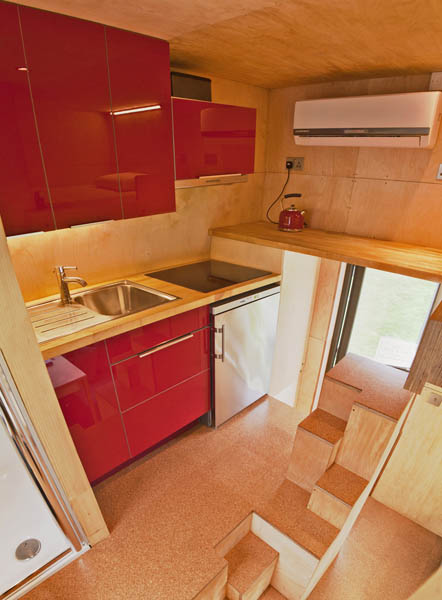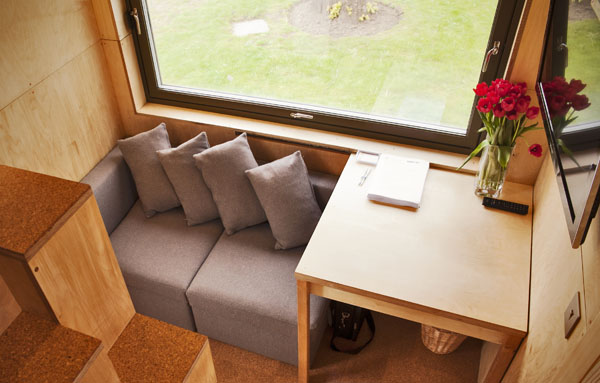INTERIOR DESIGN & ARCHITECTURE
Architects and designers create environments intending to improve dwellers' living conditions. They should take into account the user culture, lifestyle, temperament, and their environmental sensitivity in order to achieve their goal. In modern cities the size of living spaces gradually is being reduced and this leads to significant lifestyle changes and to the occupants attitudes change.
Limited privacy issues appear, claustrophobia symptoms, and stress disorder as well due to lack of storage facilities. On the other hand encouraging urban density may be positive for sustainable living.

We contacted Dr. Mike Page, engineer and lecturer in cognitive psychology at the University of Hertfordshire, author of "Cube project", a house of 27 m3 and we raised questions about small spaces design matters.

The interview
dB: What inspired you to design small spaces?
Dr Mike Page: We were inspired to construct a small home as a means of demonstrating how someone might live a comfortable, modern existence in a way that is carbon neutral over the year. The Cube is a small, well-designed space in which we have brought together a variety of low-energy technologies. Its compact size allows us to transport the Cube to various venues to demonstrate its benefits to the public.
dB: What are the main determinants in the design process of small spaces for you?
Dr Mike Page: The main determinants for us were energy efficiency and a spatial design that built all the required functionality into our (self-imposed) 3x3x3m space. We were concerned to show that a low-energy lifestyle is not necessarily bought at the cost of comfort or convenience. We, therefore, aimed for a modern interior with clean lines and plenty of light. We wanted the space to be interesting and fun, but without the need for impediments, such as ladders or fold-away structures.
dB: Do you reckon that the residents’ psychology is an important factor that affects the design of small spaces and how do you manage to overcome it?
Dr Mike Page: We consider the residents’ psychological perspective to be crucial. As the author of the Cube Project and a research psychologist I am interested in pro-environmental behaviour change. Although we are under no illusion that everyone will want to live in a space as compact as the Cube, there is definitely a constituency of people who understand what we have tried to do, and who are prepared to adopt the psychological perspective necessary to make a success of small-space living. As noted above, we have tried to make the Cube self-contained and functional, warm and inviting, while emphasizing the possibilities of establishing communities of such units, to provide a social context. Ultimately, it will be difficult to “convert” someone who is dead-set against compact living, and we have no desire to do so. As with any psychological dimension, people will differ in their willingness to live in a small home. At the margins, it may be possible to persuade people who are initially doubtful, but probably only by inviting them to try such living for a limited period (i.e., behavioural experiment), accompanied by an attempt to counteract what we might call negative automatic thoughts ( i.e., a cognitive intervention).
dB: In your opinion what kind of people prefers to live in small spaces and for what reason?
Dr Mike Page: It is difficult for us to say what kind of people prefers small-space living, as we have not formally collected such data. There is, however, clearly a group of people out there who value the elegance, the parsimony and the efficiency of compact homes. One might imagine that young people, single people of any age or, indeed, couples, might value the autonomy that a small (and transportable) home provides, particularly if the alternative is shared accommodation or some such.
dB: Do you get any feedback from the residents of the spaces you have designed? What are their thoughts on compact living?
Dr Mike Page: At the current stage, we have only received feedback from people who have visited the Cube. The vast majority of such feedback has been positive. We have yet to collect data from long-term living, though we plan to do so in the current year. We have received many offers from prospective participants.
| < Prev |
|---|



